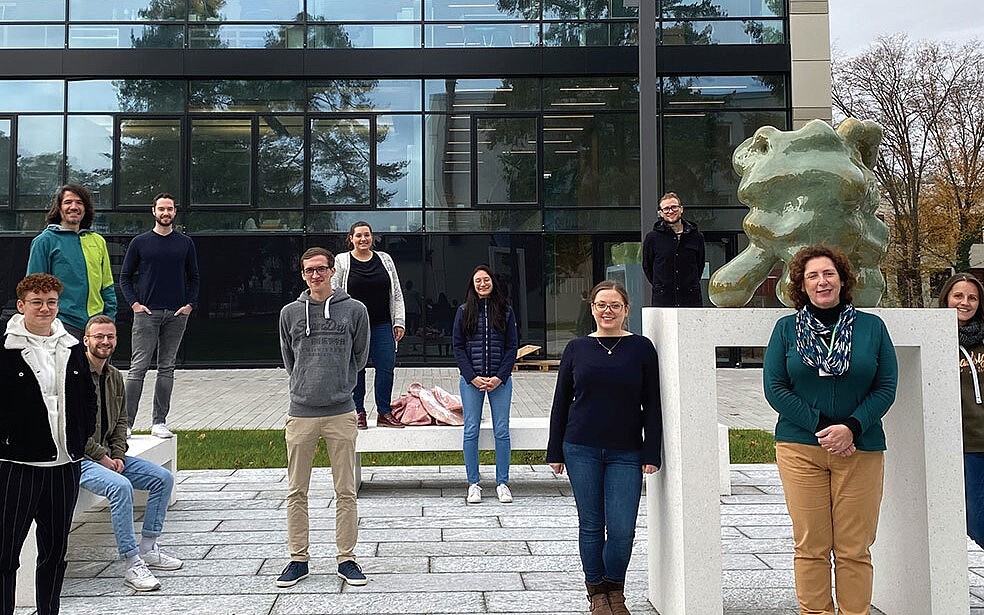Published on April 22, 2021
From bench to bedside - Interview with Prof. Dr. Véronique Orian-Rousseau
Her research focuses on the role of cell adhesion molecules in tumor progression and metastasis, with a focus on cancers from the pancreas, the colon, the breast and also leukemia. The discovery in her group of a peptide inhibiting tumor growth and metastasis of pancreatic cancer in animal models led to the foundation together with other scientists of the KIT (H. Ponta, A. Matzke-Ogi, M. Klaften) of the start-up company amcure. Currently, the company is investigating the effect of the substance on patients in clinical trials and thus a possible therapeutic use in cancer. We spoke to Prof. Orian-Rousseau about her experience in exploiting her own research results and how the founding of amcure changed her work as a scientist.

H2 Lorem Ipsum 2
Prof. Orian-Rousseau, in 2011 you founded the amcure GmbH together with colleagues of the KIT. What motivated you, as an academic researcher, to transfer your project into a company?
In my research group, we conduct basic research. At that time, we unraveled one possible mechanism of action of a protein involved in tumor progression and metastasis. We investigated the protein's molecular mechanisms of action in various experiments, including animal models, and obtained promising results. By means of a peptide, we succeeded in inhibiting pancreatic tumor growth and preventing cancer cells from forming and maintaining metastases. The protein we are investigating is overexpressed in several types of cancer. Finding a way to inhibit this protein had and still has great potential for the development of a therapeutic drug. Obviously funding such an operation requires a lot of money. Under the guidance and help of the KIT, we patented the invention, founded a start-up and attracted investors for the further development.
What were your experiences in the course of founding amcure? What kind of support did you have?
At that time, we received a lot of support from the KIT Innovation Department. Starting from the application for the patent, to the attraction of funding and the networking with investors. For various funding applications, we needed a business plan, a market analysis etc…..things we had no experience with, of course. Obviously, I am used to write research proposals, but these are completely different. The Founders' Platform of the KIT also provides regular information about current inventions and spin-offs at KIT, which I think is a very nice motivation for anyone interested in founding a company.
As academic researchers, it was not obvious for us to know how to find investors at all and to keep in contact with them. I usually attend scientific conferences as part of my work, events that are not necessarily the ones where you find investors. The difficulty also came from the fact that we were developing a therapeutic drug. Bringing a drug on the market is a very difficult and lengthy process. Even after the start of the clinical phase, it takes many years for a drug to be approved. And at any time, there is a risk that it will have to be discontinued. For investors, of course, that's an enormous risk. Not all investors were from the field of biology and cancer research and we had to win their interest for our own work. That is not easy. We had contact with companies from Germany, France, Belgium, Switzerland and even the US. It would certainly have been helpful to gain easier access to potential investors from neighbouring regions in France or Switzerland through specific trinational networking opportunities.
To what extent has the founding of amcure influenced your work as a scientist?
In the beginning, I was heavily involved in the activities of amcure. I supervised postdocs who worked for amcure and there was a close exchange with everyone involved. Currently, I am a member of the scientific advisory board of amcure and informed on the current progress. Of course, I was and still am focused on academic research. At that time, my colleagues were highly involved in the exchange with potential investors. I also participated to a certain extent in the meetings with investors, a new experience for me. At a conference, I was also approached by a big German pharmaceutical company and was invited to present our data on site. That was a new experience for me and it was nice to realize that the companies showed interest in our work. Today, I am giving a lecture at the University of Heidelberg (Medizinische Fakultät Mannheim der Universität Heidelberg) on founding a company and how to start one's own business from academic research. I explain step by step how we proceeded back then. I really enjoy passing on that knowledge to the students.
Your research group is currently participating in the funding program "EURIdoc" (Eucor Upper Rhine Immunology doctoral program), which is specifically aimed at international doctoral students and was initiated by the trinational university network EUCOR. What do you see as the advantages of networking and cooperation with partners in the Upper Rhine region?
The program means for us to work together with top scientists from France and Switzerland and also within Germany. This is a great opportunity. We are in close exchange with the partner universities and our students from Karlsruhe will get the opportunity to attend courses at the other EUCOR universities. We will work together for four years, sharing our research and producing common scientific publications with the prospect of winning more EU funding in the future.
Prof. Orian-Rousseau, thank you very much for the interview.
The interview was conducted by Katharina Stöckle.

comments about this article
No Comments